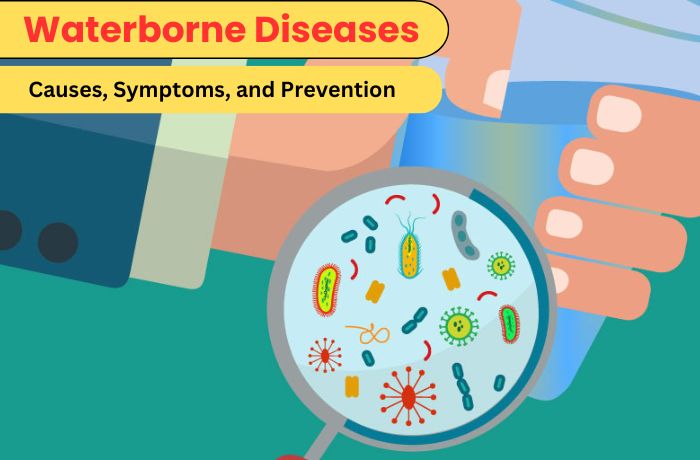
- June 11, 2024
Understanding Waterborne Diseases: Causes, Symptoms, and Prevention
Water is essential for life, but it can also be a source of several diseases that pose significant health risks. Waterborne diseases are a major public health concern worldwide, especially in areas with poor sanitation and limited access to safe drinking water. In this blog, we will explore the causes and symptoms of waterborne diseases and provide essential information on how to prevent them.
Introduction :
Imagine enjoying a refreshing glass of water only to discover that it contains dangerous bacteria that could make you seriously ill. This is the reality for millions of people around the world who are at risk of contracting waterborne diseases. These diseases, caused by microorganisms such as bacteria, viruses, and parasites, are transmitted through contaminated water. Understanding the causes and symptoms of waterborne diseases is essential to protecting your health and ensuring safe water consumption.
What is a waterborne disease?
Waterborne diseases are diseases caused by pathogenic microorganisms that are transmitted through water. These pathogens can be bacteria, viruses, or parasites and can cause a variety of illnesses, ranging from mild gastroenteritis to severe, life-threatening diseases. Contamination of water sources often occurs due to inadequate sanitation, improper waste disposal, and a lack of proper water treatment facilities.
Common Waterborne Diseases :
1. Cholera: Caused by the bacterium Vibrio cholerae, cholera is characterized by severe diarrhea and dehydration. It is spread primarily through contaminated drinking water and food.
2. Typhoid fever: This bacterial infection, caused by Salmonella typhi, is spread through contaminated water and food. Symptoms include high fever, weakness, abdominal pain, and loss of appetite.
3. Hepatitis A: A viral infection that affects the liver, hepatitis A is spread by ingesting contaminated food and water. Symptoms include jaundice, fatigue, nausea, and abdominal pain.
4. Giardiasis: Caused by the parasite Giardia lamblia, giardiasis is characterized by diarrhea, cramps, and nausea. It is often spread through drinking water contaminated with feces.
5. Cryptosporidiosis: This parasitic disease, caused by Cryptosporidium, results in watery diarrhea and abdominal cramps. It is spread by ingesting contaminated water and food.
Causes of Waterborne Diseases :
Waterborne diseases are mainly caused by the consumption of contaminated water. Here are the main factors that lead to water contamination:
1. Microbial Contamination
The most common cause of waterborne disease is the presence of pathogenic microorganisms in water sources. These microorganisms can include bacteria, viruses, and parasites that thrive in contaminated environments.
2. Inadequate sanitation
Poor sanitation practices, such as open defecation and improper waste disposal, can lead to fecal contamination of water sources. This greatly increases the risk of waterborne diseases.
3. Lack of clean water access.
In many parts of the world, especially in developing countries, access to clean and safe drinking water is limited. People are often forced to use untreated water from contaminated sources.
4. Floods and natural disasters
Natural disasters such as floods can overwhelm sanitation systems and contaminate drinking water supplies with harmful pathogens.
5. Agricultural runoff
Runoff from agricultural fields containing pesticides, fertilizers, and animal waste can contaminate waterways and lead to the spread of waterborne diseases.
Symptoms of Waterborne Diseases :
Symptoms of waterborne illnesses can vary widely depending on the specific bacteria involved. However, some common symptoms to look for include
1. Diarrhea
One of the most common symptoms, diarrhea can lead to severe dehydration and is a common symptom of many waterborne illnesses.
2. Nausea and vomiting
These symptoms often indicate gastrointestinal infections caused by contaminated water.
3. Abdominal pain and cramps
Abdominal pain and cramping are common symptoms, especially with infections caused by parasites and bacteria.
4. Fever
High fever is a common symptom of bacterial infections such as typhoid and other systemic waterborne diseases.
5. Fatigue and weakness
General malaise and weakness often accompany infections, making it difficult for the person to carry out daily activities.
6. Jaundice
Yellowing of the skin and eyes, or jaundice, is a symptom of hepatitis A and indicates liver involvement.
Preventing Waterborne Diseases :
Preventing waterborne diseases involves a combination of personal hygiene practices, community efforts, and infrastructure improvements. Here are some key tips to keep in mind:
1. Ensure safe drinking water
Use water filters or purifiers to treat drinking water.
Boil water to kill bacteria before consumption.
Use chlorine tablets or iodine to disinfect water.
2. Practice good hygiene
Use proper toilets and avoid open defecation.
Ensure safe disposal of human and animal waste.
3. Maintain personal hygiene
Wash hands thoroughly with soap and water before eating and after using the bathroom.
Keep nails trimmed and clean to prevent the harboring of germs.
4. Food safety measures
Wash fruits and vegetables thoroughly before eating.
Cook food to the proper temperature to kill pathogens.
Avoid eating raw or undercooked meat and seafood.
5. Community and government initiatives
Support initiatives to provide clean water and improve sanitation.
Participate in community education programs on the importance of hygiene and safe water practices.
Conclusion :
Waterborne diseases remain a critical public health challenge, particularly in regions with limited access to clean water and adequate sanitation. By understanding the causes and symptoms of these diseases and taking preventive measures, we can significantly reduce the risk of infection and improve overall health outcomes. Remember, access to clean water is not only a necessity, it is a fundamental human right. Let’s work together to ensure safe water for all.
If you are experiencing symptoms of waterborne disease, consider consulting with Dr. Suresh Jain, a highly regarded gastroenterologist in Pune. With extensive experience in the diagnosis and treatment of gastrointestinal diseases, . His commitment to patient education and public health awareness makes him a valuable resource in the fight against waterborne diseases.
